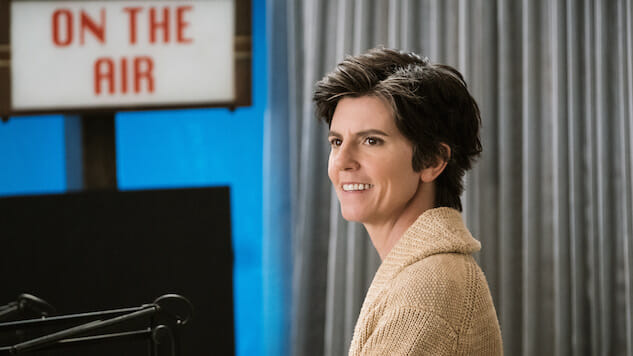Tig Notaro’s One Mississippi Is the Portrait of “Red State” Progressives We Need Right Now
Photo: Amazon Prime Video
I knew One Mississippi filmed a scene in my neighborhood because an Uber driver once mentioned that she appeared as an extra, and there it is in the opening shot: Royal Street, in New Orleans’ French Quarter, a block from the courtyard where I write to you now. Just out of picture is the bodega where I buy my morning coffee; just behind the camera’s position is LaLaurie Mansion, of ghost tour and Coven fame. Later, there’s a Dr. John cameo and a sly dig at the Times-Pic, which also serves as a sly dig at Tig Notaro herself, and though I can’t profess to know much more of the Mississippi coast than what I’ve gleaned from a few short visits, the series’ references to “New Hope Ministry” and “the all-you-can-eat at Shrimpers” recall the rural parish where I once taught high school, upriver from the city on the way to Baton Rouge.
This is unremarkable, perhaps—I imagine there are folks in New York and Los Angeles for whom the sight of their street is a mundane occurrence—but in the context of One Mississippi’s brief, remarkable new season, such images of home begin to carry real weight. In its sophomore outing, Amazon’s idiosyncratic series—so close to Notaro’s own experience that her character’s love interest is played by her wife—holds on to the personal and adds the political, emerging as a portrait of “red state” progressives that blurs the map purple, at least from New Orleans to “Bay St. Lucille.”
Season Two toggles between that Gulf Coast burg, to which Tig returns in Season One after the death of her mother, and The City That Care Forgot, where she and her producer/crush, Kate (Stephanie Allyne), find their radio show has a following, and perhaps a future. Tig’s brother, Remy (Noah Harpster), burns one relationship and begins another; her stepfather, Bill (John Rothman), continues to regain his bearings after becoming a widower, aided by a companion, Felicia (the terrifically funny Sheryl Lee Ralph), who’s as fastidious as he is. In One Mississippi, the plot ambles along—it’s a series so specific that even its “sense of humor” is no more than a tone, harder to pin down than sand flies in Biloxi. To call it “deadpan,” after Notaro’s stand-up, seems to me to imply an ironic distance that One Mississippi does not quite possess: As with Tig and Kate’s radio hour, the series is enamored of stories in all their particulars, the slack stretches and strange meetings and uncomfortable glances in which we no longer reflect film and TV’s taut yarns. Its main article of faith is the idea that who we are and what we value is ultimately shaped by our walk through the world, by trauma and grief and success and affection, and that the places we come from (or choose to live) are only one part of this complex equation.
-

-

-

-

-

-

-

-

-

-

-

-

-

-

-

-

-

-

-

-

-

-

-

-

-

-

-

-

-

-

-

-

-

-

-

-

-

-

-

-








































